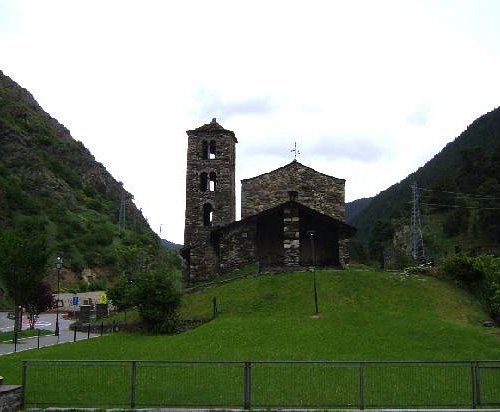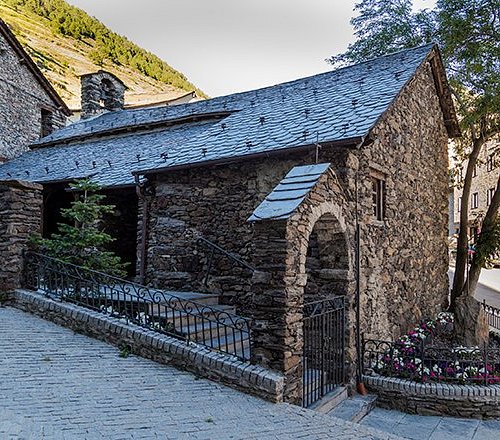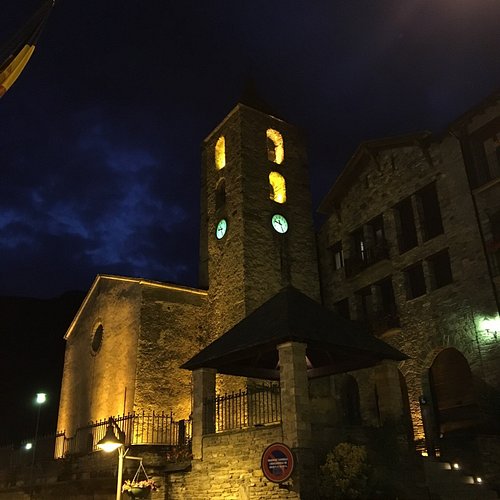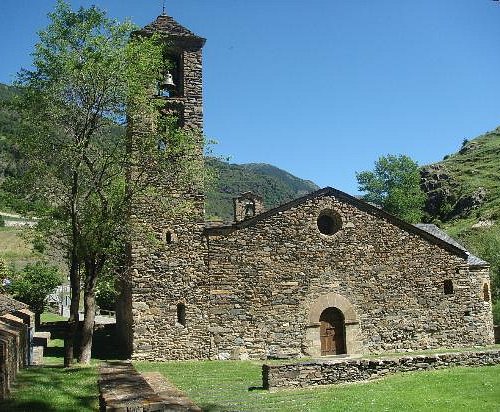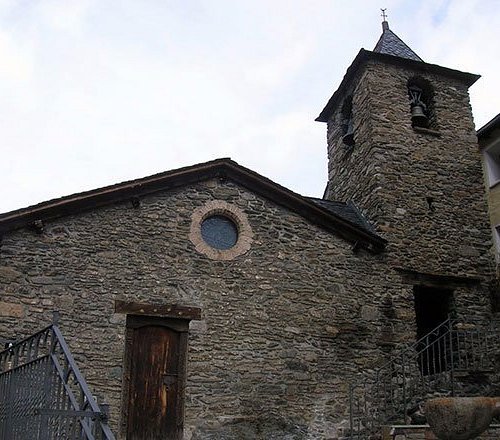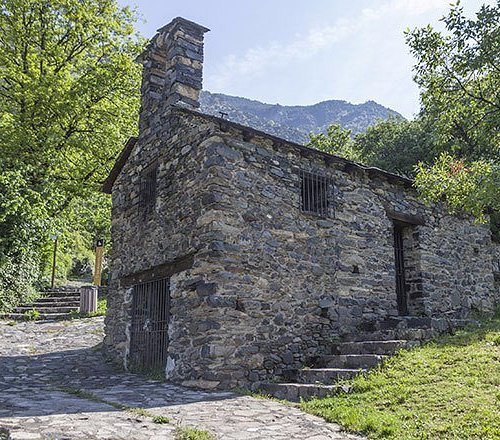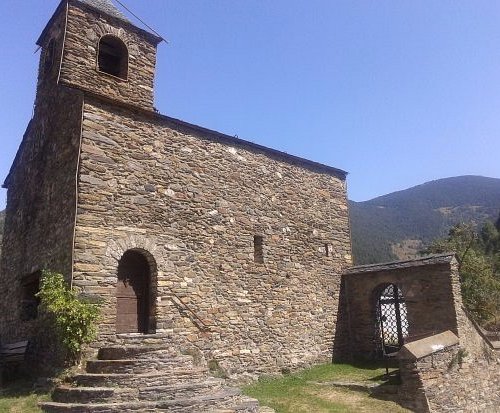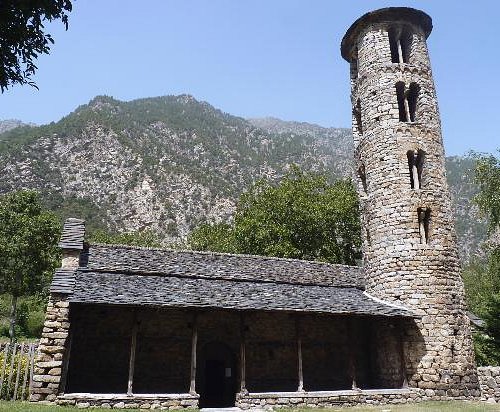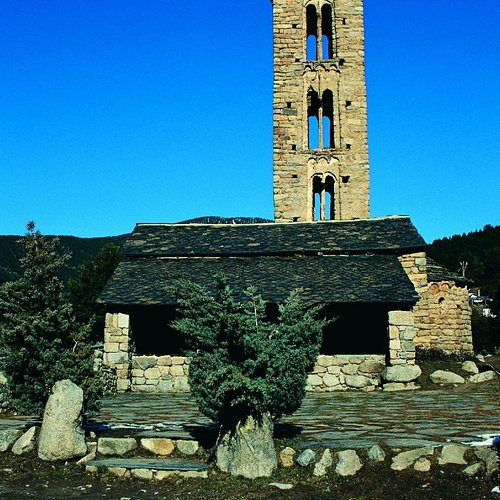Things to do in Andorra, Andorra: The Best Churches & Cathedrals
in Europe (dark grey) – [Legend]
Restaurants in Andorra
1. Church of Sant Joan de Caselles
Overall Ratings
4.5 based on 165 reviews
The building dates from the 11th-12th century and follows the architectural style of other Andorran Romanesque churches: it has a rectangular single nave with wooden ceiling, a semi-circular apse andLombard-style belfry. It conserves two archways probably built in the16th and 17th centuries.The interior has remains of a 12th century Romanesque stucco crucifix surrounded by a mural showing the crucifixion with Longinus andStephanon accompanied by the Sun and Moon. Behind the altar grillis a highly artistic 16th century altarpiece showing Italian and German Renaissance influence with scenes from the life and martyrdomof Saint John, author of the book of Revelations and patron saint ofthe church.
Reviewed By restfulm - San Juan, Caribbean
A well-preserved small church, wonderful example of Romaesque architecture, with an unusual crucifix.
2. Eglise de Sant Bartomeu de Soldeu
3. Esglesia de Sant Corneli i Sant Cebria d'Ordino
Overall Ratings
4.5 based on 49 reviews
4. Church of Sant Marti de La Cortinada
Overall Ratings
4.5 based on 36 reviews
Open from 15 July to 15 September. A 12th century Romanesque church with additions from the 17th and18th centuries. It preserves mural paintings by the masterartist of La Cortinada from the end of the 12th century.The church was extended in the Baroque period: the direction of thenave was changed and the new high altar was decorated with a 17thcentury polychrome wood altarpiece dedicated to the church's patronsaint. The side chapels also house Baroque altarpieces dedicated tothe Virgin Mary, Saint Anthony the Great and Our Lady of the Roses.The wrought iron rails, 17th century wooden furniture and the carillonor confessional box are other important features of the church. Othercivil architecture features to be seen near the church include the CalPal millstone and sawmill - an example of small traditional industry and the ancestral seat of Cal Pal with its unique white dovecot.
5. Church of Sant Andreu d'Arinsal
6. Iglesia de San Roma dels Vilars
7. Sant Climent de Pal
Overall Ratings
4.5 based on 27 reviews
Open from Mai to October. Pal is one of the best-preserved rural villages in Andorra and has beenpart of a special traditional architecture protection plan since 1997.The church, the site's most outstanding structure, dates from the late11th to early 12th centuries, with modern additions. The nave is rectangular and conserves a large part of the Romanesque walls. Thepresent apse is square (17th-18th centuries) and replaces an originalRomanesque structure.The Lombard-style belfry has three double-windowed floors, the topone featuring twin double windows, unique in Andorra. Inside thereis a granite font, a Romanesque statue of Our Lady of the Remedies(13th century), two processional polychrome wood crosses and analtarpiece dedicated to Pope Saint Clement, the church's patron saint (1709).Visitors can also go to the Andorra Romanesque Interpretation Centreto see how the Romanesque evolved in the Andorran valleys.
8. Sant Cristofol d'Anyos Church
Overall Ratings
4.5 based on 61 reviews
Reviewed By FoxDylan - Adelaide, Australia
This little church is incredibly beautiful, it is small & you cannot enter, however it is definitely worth visiting, I love driving up the curvy road to sit on either the slate stairs or the little bench in the front & admire the beautiful view. You can see the mountains & the town of La Massana & it’s great for photos. The only downside to this gorgeous place is that some dog owners cannot comprehend why they should pick up their dogs poop & as it is a popular place to walk your dog (I take my 2 up there). It’s so disappointing because their is even free dog poop bags provided. However, don’t be too discouraged, just watch where you step. I once was lucky enough to meet a gentleman up there who was exercising his pet eagle, it was seriously cool to watch a 3yr old eagle flying free & then happily returning to her human, sadly she was injured when she was young & was unable to return to the wild. If you love old architecture, you should visit, it can be a lovely spot to relax as well or have a picnic.
9. Santa Coloma Church
Overall Ratings
4.5 based on 118 reviews
Open from 15 July to 15 September. [ING]This pre-Romanesque building houses a rectangular nave with a woodenframed ceiling and a quadrangular apse. The circular Lombard belfry wasadded in the 12th century and is one of the few examples of its kind in the Pyrenees.The building was decorated with 12th-century Romanesque mural paintings by the master painter of Santa Coloma. These paintings left the country in 1930,and were recovered by the Andorran Government in 2007.At present, only the Agnus Dei flanked by two angels and the geometricdecoration framing the overhanging arch remain in the church. The church preserves a polychrome wood statue of Our Lady of the Remedies (12th to 13th centuries) and a Baroque altarpiece (18th-century) dedicated to Saint Coloma, the church's patron saint.The church's location means visitors can enjoy Santa Coloma old town with its traditional buildings, as well as Els Russos tower, designed by Cesar Martinell, of modernist style an example of Andorra's granite architecture.
10. Esglesia de Sant Miquel d'Engolasters
Overall Ratings
4.5 based on 80 reviews
Open from 15 July to 15 September. This church, Romanesque in origin, was built sometime before the 12thcentury. The rectangular layout has a nave, a semi-circular apse, a gable roof, a belfry and a later porch. The building is peculiar for the disproportion between the nave and the 17-metre high belfry. The top level of the belfry preserves one of the few examples of Romanesque sculpture in Andorra: heads carved in the centre of the double window arches.On show inside are reproductions of Romanesque mural paintings bythe master artist of Santa Coloma from the 12th century. The apse isdominated by a Christ Pantocrator surrounded by the tetramorph wherethe Archangel Michael, the church's patron saint, merges with the symbol of Saint Matthew. The original paintings are now held by the National Art Museum of Catalonia (MNAC).
Reviewed By restfulm - San Juan, Caribbean
No two churches in Andorra are alike. The bell tower and the porch of Sant Miquel give it distinctive touches that set it apart.

